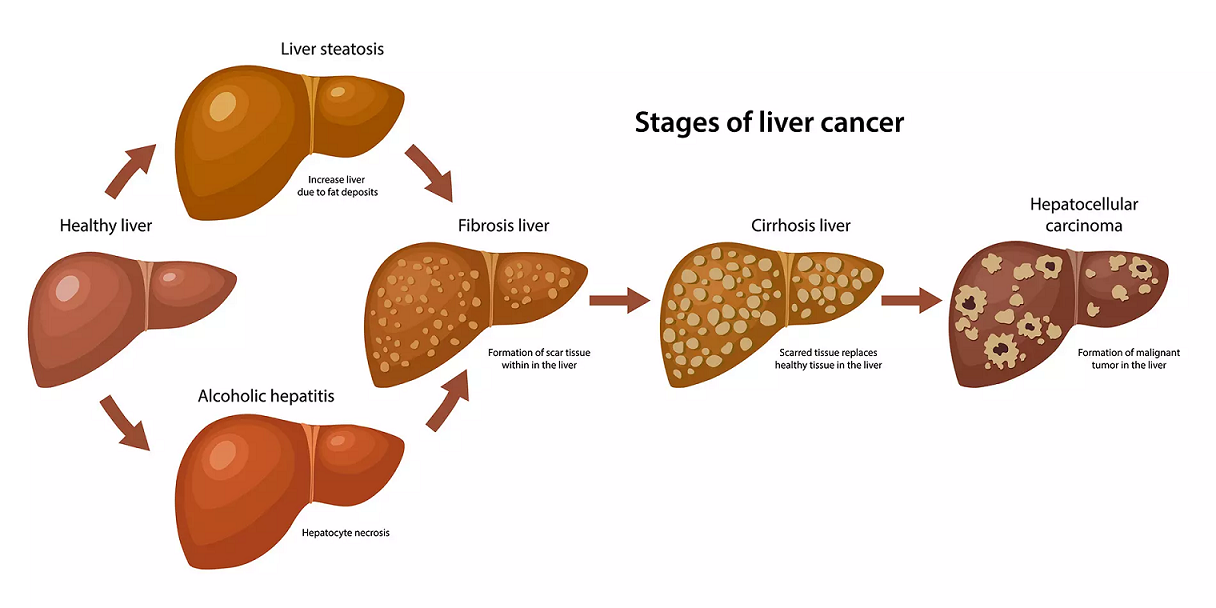Liver Cancer
Liver Cancer Diagnosis and Staging
Learn about the diagnosis and staging of Liver cancer.

DIAGNOSIS
If you have symptoms that suggest liver cancer, your doctor will try to find out what's causing the problems.
You may have one or more of the following tests:
- Physical exam: Your doctor feels your abdomen to check the liver, spleen, and other nearby organs for any lumps or changes in their shape or size. Your doctor also checks for ascites, an abnormal buildup of fluid in the abdomen. Also, your skin and eyes may be checked for signs of jaundice.
- Blood tests: Many blood tests may be used to check for liver problems. One blood test detects alpha-fetoprotein (AFP). High AFP levels could be a sign of liver cancer. Other blood tests can show how well the liver is working.
- CT scan: An x-ray machine linked to a computer takes a series of detailed pictures of your liver and other organs and blood vessels in your abdomen. You may receive an injection of contrast material so that your liver shows up clearly in the pictures. On the CT scan, your doctor may see tumors in the liver or elsewhere in the abdomen.
- MRI: A large machine with a strong magnet linked to a computer is used to make detailed pictures of areas inside your body. Sometimes contrast material makes abnormal areas show up more clearly on the picture.
- Ultrasound test: The ultrasound device uses sound waves that can't be heard by humans. The sound waves produce a pattern of echoes as they bounce off internal organs. The echoes create a picture (sonogram) of your liver and other organs in the abdomen. Tumors may produce echoes that are different from the echoes made by healthy tissues.
- Biopsy: A biopsy usually is not needed to diagnose liver cancer, but in some cases, the doctor may remove a sample of tissue. The doctor inserts a thin needle into the liver to remove a small amount of tissue. CT or ultrasound may be used to guide the needle. A pathologist uses a microscope to look for cancer cells in the tissue.
STAGING
If liver cancer is diagnosed, your doctor needs to learn the extent (stage) of the disease to help you choose the best treatment. Staging is an attempt to find out whether the cancer has spread, and if so, to what parts of the body.
When liver cancer spreads, the cancer cells may be found in the lungs. Cancer cells also may be found in the bones and in lymph nodes near the liver.
When cancer spreads from its original place to another part of the body, the new tumor has the same kind of abnormal cells and the same name as the primary tumor. For example, if liver cancer spreads to the bones, the cancer cells in the bones are actually liver cancer cells. The disease is metastatic liver cancer, not bone cancer. It's treated as liver cancer, not bone cancer. Doctors sometimes call the new tumor "distant" or metastatic disease.
To learn whether the liver cancer has spread, your doctor may order one or more of the following tests:
- CT scan of the chest: A CT scan often can show whether liver cancer has spread to the lungs.
- Bone scan: The doctor injects a small amount of a radioactive substance into your blood vessel. It travels through the bloodstream and collects in the bones. A machine called a scanner detects and measures the radiation. The scanner makes pictures of the bones. The pictures may show cancer that has spread to the bones.
- PET scan: You receive an injection of a small amount of radioactive sugar. The radioactive sugar gives off signals that the PET scanner picks up. The PET scanner makes a picture of the places in your body where the sugar is being taken up. Cancer cells show up brighter in the picture because they take up sugar faster than normal cells do. A PET scan shows whether liver cancer may have spread.
Know in detail about liver cancer treatment (what it is, its purpose, risk factors etc.) here.





































































































